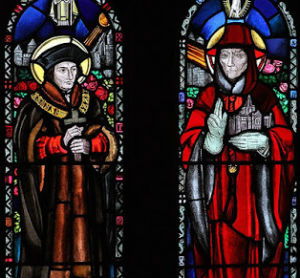We ask you, urgently: don’t scroll past this
Dear readers, Catholic Online was de-platformed by Shopify for our pro-life beliefs. They shut down our Catholic Online, Catholic Online School, Prayer Candles, and Catholic Online Learning Resources—essential faith tools serving over 1.4 million students and millions of families worldwide. Our founders, now in their 70's, just gave their entire life savings to protect this mission. But fewer than 2% of readers donate. If everyone gave just $5, the cost of a coffee, we could rebuild stronger and keep Catholic education free for all. Stand with us in faith. Thank you.Help Now >
St. Thomas More and St. John Fisher: Catholic Martyrs
FREE Catholic Classes
The feast of Saints John Fisher and Thomas More is observed as an optional memorial June 22. So that our readers don't have to fish for more information, CNA has compiled a question-and-answer lowdown on their lives and legacies:

Sts. Thomas More and John Fisher share the same Feast Day.
Highlights
Catholic Online (https://www.catholic.org)
6/22/2018 (6 years ago)
Published in Living Faith
Keywords: St. Thomas More, St. John Fisher, Christian Faith, Catholic Saint
London, England (CNA) -
Who was St. Thomas More?
St. Thomas More (1478-1535) was a humanist and intellectual - he worked as a lawyer and explored theology through his written works, many of which were defenses of the Catholic faith against heresy. He studied at Oxford and briefly considered religious life, but he eventually followed a vocation to marriage and fatherhood.
More was appointed by King Henry VIII to be Lord Chancellor of England in 1529.
What does "Lord Chancellor" mean?
The "Lord Chancellor" was the highest ranking member of the King's cabinet. This role was commonly filled by a clergyman. Historically, the role entailed great judicial responsibility - its influence has evolved to scale back on this particular front.
How did he manage to get on Henry VIII's bad side?
St. Thomas More stood firmly in his Catholic faith when Henry VIII began to pull away from the Church.
The king wanted a declaration of nullity for his marriage to Catherine of Aragon, but the Church, upon examination, could not find his marriage to Catherine invalid. More refused in 1530 to sign a letter asking the pope to declare the marriage null, and would not sign an oath acknowledging the monarch as the supreme head of the Church in England.
In May 1532 Henry pressured the English synod, the Convocation of Canterbury, to submit the clergy's authority to his own. The day after the convocation agreed to Henry's terms, More resigned as Lord Chancellor.
More wished to retire from public life, but when he refused to assent to the Act of Supremacy 1534, which repudiated the pope's authority over the Church in England, he was imprisoned on charges of treason.
He was sentenced to execution, which took place July 6, 1535.
Why is he a saint?
More's persistence to remain sided with the Church rather than the king, ending in martyrdom, was a testament to his tireless devotion to God's law. He was canonized by Pius XI in 1935, and was named patron of statesmen and politicians by St. John Paul II.
I've heard something about his beard...?
Yes. You're not imagining things, don't worry.
The story with St. Thomas More's beard is that he laid his beard outside of the execution blade's path in one final, humorous gesture.
His last words were,"This hath not offended the King," implying that while his head had angered Henry VIII, his beard was innocent and did not deserve to be severed.
Who was St. John Fisher?
St. John Fisher (1469-1535) was ordained a priest when he was about 22, and was appointed Bishop of Rochester in 1504. He lived an intentionally simple lifestyle and was an intellectual. He studied theology at Cambridge, where he became chancellor. Among his writings is a commentary on the seven penitential psalms.
His mission as a bishop was to perfect how the Church's teachings were conveyed by his diocese. Fisher spent much of his time travelling to parishes with the mission of theologically correcting and realigning clergy. He also wrote various apologetic defenses in response to Martin Luther.
What did he have to do with the whole Henry VIII situation?
St. John Fisher studied Henry's request for a declaration of nullity, but could not find grounds for such a declaration.
He refused to assent to the Succession to the Crown Act 1533, which recognized the king's supremacy over the Church in England and declared the daughter of Catherine of Aragon illegitimate, and was imprisoned for treason in April 1534.
Fisher was jailed, starved and deprived of all sacraments, but he didn't budge on his position.
Fisher was made a cardinal in May 1535, in the hopes that Henry would not dare execute a prince of the Church.
Please don't tell me it ended like More's story...
It didn't. There was no beard on the line.
However, Fisher was executed, head on the chopping block and all. He removed his hair shirt, and said the Te Deum and Psalm 31 right before giving his life for the kingdom of God and the honor of the Church, June 22, 1535. He is the only cardinal to have been martyred.
Why is Fisher a saint?
Same deal as More - he stuck to what he knew to be the truth and died for it. He was canonized with More in 1935 by Pius XI.
But he's not nearly as well-known as St. Thomas More!
No, he's not. St. Thomas Fisher's grave, which also contains the bones of More, doesn't even bear his name. But he did it for the glory of God.
---
'Help Give every Student and Teacher FREE resources for a world-class Moral Catholic Education'
Copyright 2021 - Distributed by Catholic Online
Join the Movement
When you sign up below, you don't just join an email list - you're joining an entire movement for Free world class Catholic education.

-

-
Mysteries of the Rosary
-
St. Faustina Kowalska
-
Litany of the Blessed Virgin Mary
-
Saint of the Day for Wednesday, Oct 4th, 2023
-
Popular Saints
-
St. Francis of Assisi
-
Bible
-
Female / Women Saints
-
7 Morning Prayers you need to get your day started with God
-
Litany of the Blessed Virgin Mary
Daily Catholic
 Daily Readings for Tuesday, December 24, 2024
Daily Readings for Tuesday, December 24, 2024St. Adele: Saint of the Day for Tuesday, December 24, 2024
 Christmas Prayer: Prayer of the Day for Tuesday, December 24, 2024
Christmas Prayer: Prayer of the Day for Tuesday, December 24, 2024- Daily Readings for Monday, December 23, 2024
- St. John of Kanty: Saint of the Day for Monday, December 23, 2024
- Christmas Prayer: Prayer of the Day for Monday, December 23, 2024
![]()
Copyright 2024 Catholic Online. All materials contained on this site, whether written, audible or visual are the exclusive property of Catholic Online and are protected under U.S. and International copyright laws, © Copyright 2024 Catholic Online. Any unauthorized use, without prior written consent of Catholic Online is strictly forbidden and prohibited.
Catholic Online is a Project of Your Catholic Voice Foundation, a Not-for-Profit Corporation. Your Catholic Voice Foundation has been granted a recognition of tax exemption under Section 501(c)(3) of the Internal Revenue Code. Federal Tax Identification Number: 81-0596847. Your gift is tax-deductible as allowed by law.







 Daily Readings for Tuesday, December 24, 2024
Daily Readings for Tuesday, December 24, 2024 St. Adele: Saint of the Day for Tuesday, December 24, 2024
St. Adele: Saint of the Day for Tuesday, December 24, 2024 Christmas Prayer: Prayer of the Day for Tuesday, December 24, 2024
Christmas Prayer: Prayer of the Day for Tuesday, December 24, 2024

